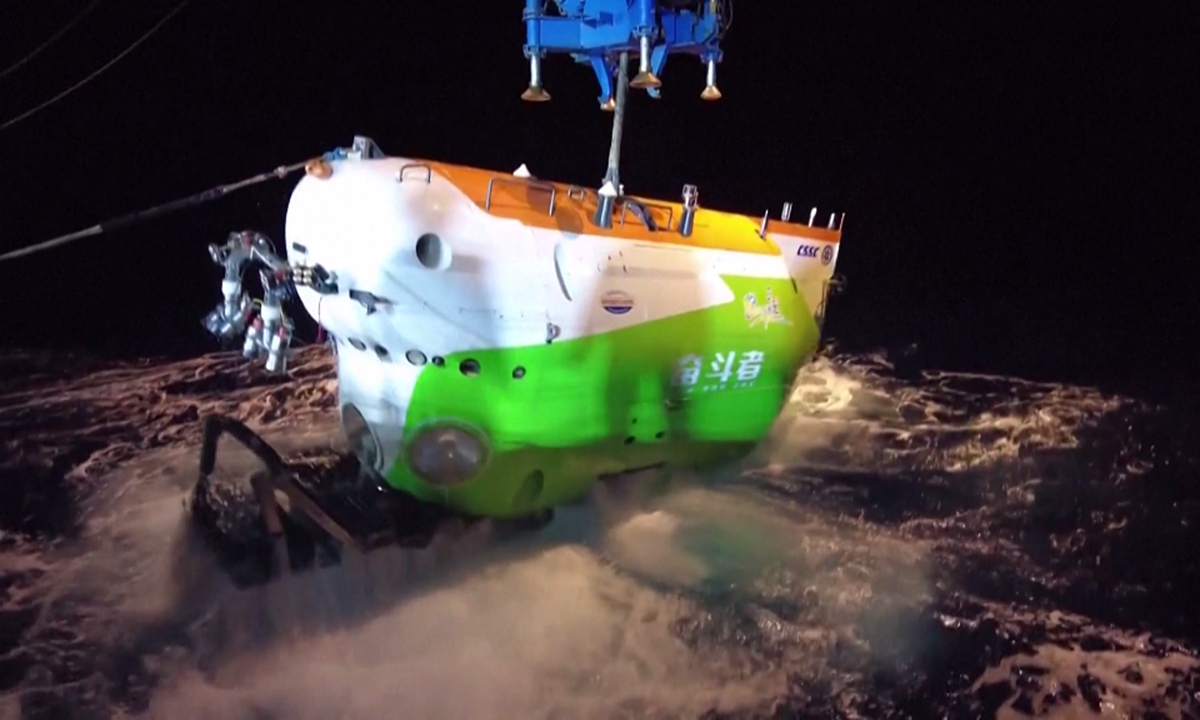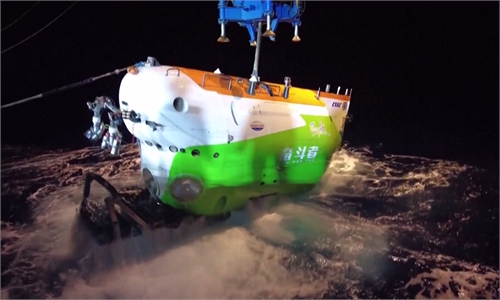More than half of the world’s manned deep-sea diving missions done by Chinese submersibles: CPPCC member

Photo: VCG
More than half of the world's manned deep diving missions have been completed by China's three deep-sea manned submersibles, Jiaolong, Shenhai Yongshi (Deep Sea Warrior) and Fendouzhe (Striver) during the past three years, Ye Cong, member of the National Committee of the Chinese People's Political Consultative Conference (CPPCC) and chief designer of Fendouzhe, said on Monday.
The remarks were made as China's top political advisory body, the CPPCC National Committee, opened its annual session on Monday in Beijing. On the occasion, CPPCC representatives and NPC deputies from all walks of life gather at the annual two sessions, discussing important matters pertaining to the nation's development and needs of the people.
The deep-sea manned submersibles are a significant example of the nation's achievements in homegrown tech innovation as well as China's active participation in helping the world to better understand, protect and explore the deep sea.
Over the past four years, Fendouzhe has completed a total of 230 dives, 25 of which were deeper than 10,000 meters, allowing 32 people to reach the seabed at 10,000 meters below the surface to carry out operations, Ye said.
Fendouzhe is China's first manned submersible that can reach the deepest part of the world's oceans for scientific research and exploration. In 2020, Fendouzhe made history on November 10, 2020, when it successfully landed on the Mariana Trench in the western Pacific Ocean, the deepest point of the Earth, reaching a depth of 10,909 meters and setting a new record for the Chinese manned deep-diving mission, according to Ye.
The submersible also achieved the first live video interaction from a 10,000-meter seabed location.
From 2022 to 2023, Fendouzhe completed its first scientific research mission around Oceania. The dive locations included the Kermadec Trench area of the southwest Pacific Ocean and the Diamantina Trench in the southeastern Indian Ocean, with a total of 63 dives, setting record for a single-voyage dive, according to Ye.
Many foreign scientists have also participated in the deep-sea exploration using Chinese submersibles, Ye said, an example of China's deep-sea exploration has been open and inclusive for international cooperation.
Just now, Fendouzhe is doing deep-sea exploration at Sunda Trench or the Java Trench in the Indian Ocean, as part of the cooperation between China and Indonesia, Ye said.
During the past three years, more than half of the world's manned deep diving missions have been completed by China's three deep-sea manned submersibles, Jiaolong, Shenhai Yongshi and Fendouzhe. The three submersibles have made more than 1,100 dives so far, Ye said.
In an interview with the Global Times on Monday, Ye said that the achievements on deep-sea scientific research are inseparable from the country's advanced shipbuilding industry, which leads the world.
"Only with the solid foundation can we better support the development of our deep-sea scientific exploration and the improvement of our tools," Ye said.
When asked by media about deep-sea explorations, Ye emphasized the importance of taking into account of their potential environmental impact on maritime ecosystem. "We are equally concerned about the environmental ramifications and believe that comprehensive assessments and analyses are imperative," Ye said.
Regarding explorations in the future, he said: "We will strive to extend our works in more deep-sea areas, including the polar areas. Also, we will carry out systematic work and build a detection operation and development system from space to the sea surface, and from underwater to the seabed, in order to improve our perception of the entire ocean system," Ye said.
"As marine science and technology workers, we must continue to sum up experiences from the extreme deep dives of Fendouzhe, climb to the peak of deep-sea science and technology, and continue to make new contributions to the better understanding, protection, and development of the ocean system for the mankind," Ye said.


